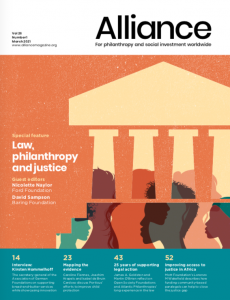The small but influential percentage of funding for legal action needs to be less focused on courts and more global in scope. That’s the view of the guest editors of Alliance’s March 2021 issue on law, philanthropy and justice.
Foundations can be reluctant to dive into legal work, but it can be an important tool for achieving social change, write Nicolette Naylor and David Sampson.
Naylor, international programme director of Gender, Racial and Ethnic Justice at the Ford Foundation in South Africa, and Sampson, deputy director at the UK’s Baring Foundation, together make the case for greater philanthropic engagement in the legal field.
‘…our work often sits at the intersection of state and citizen. In a world of growing inequality, attacks on the rule of law and deep uncertainty, we are excited to examine legal action as a key tool for interrogating and challenging power and advancing justice,’ write Naylor and Sampson.
Where should philanthropy start?
Only seven funders made grants in excess of $10 million for litigation, and fifty per cent of the top 100 funders of litigation made grants of $1 million or less according to the latest data from Candid. Of the money that is being spent on legal philanthropy, most of it is within American borders: only 11 per cent of the $350 million allocated to law education in 2017-18 was spend outside of the US and less than two per cent went to non-US based residents.
‘Our experience is also that many funders find this work daunting, believing that it requires legal knowledge or new grantmaking practices,’ write Naylor and Sampson, adding that: ‘As so many of us refocus our efforts on how to better listen to the communities we serve, the specialised work of legal action and legal strategies may seem to smack of elitism.’
However, supporting legal strategies in the areas that foundations are working often opens a different dimension of furthering impact there. Naylor and Sampson suggest that funders should look to support the institutions of democracy including the independence of the judiciary and a robust civil society sector; reassess the notion of results and ‘wins’ and ‘losses’ – a loss in court can still mobilise a campaign to change hearts and minds; protect the defenders of human rights who often place their own lives at risk in doing this work; and also, stay in it for long haul – change takes time.
Throughout the issue, authors from around the world share insights into their own experiences in funding in the legal space, for example the Mott Foundation’s work in supporting community paralegals in Africa. Areas of focus include the importance of funding people-centred justice, the connection between movements for change and upholding the rule of law, and the ways law can be used as a tool to build legal progress and solidarity around the globe.
Legal funding should mean supporting communities
Naylor and Sampson write: ‘All of us working in philanthropy can and should question whether our funding supports the communities we serve. We should aim to see what justice looks like for them, within their context, and help people make their own, informed decisions on legal action. This may involve re-imagining justice and how the law interacts with communities most in need. It may well involve challenging power at a range of levels within society.
‘In the end, it will be their knowledge, courage and leadership that will create lasting social change and this requires philanthropy to be bold in its approaches and generous in its support.’
New issue: Law, philanthropy and justice
 Legal action has a significant contribution to make to achieving social change and covers a huge range of fundable activities. These include widening access to justice, supporting public legal education, investing in the next generation of activist lawyers and helping human rights defenders and climate activists. Yet only a small part of organised philanthropy has a specific strategy for legal action and many funders are cautious about working in this area. This issue will explore new ways for funders to reimagine justice and debate effective strategies for contemporary philanthropic engagement in and with the law. Guest edited by Nicolette Naylor, Director of the Southern Africa office of the Ford Foundation and David Sampson, Deputy Director, Baring Foundation, UK.
Legal action has a significant contribution to make to achieving social change and covers a huge range of fundable activities. These include widening access to justice, supporting public legal education, investing in the next generation of activist lawyers and helping human rights defenders and climate activists. Yet only a small part of organised philanthropy has a specific strategy for legal action and many funders are cautious about working in this area. This issue will explore new ways for funders to reimagine justice and debate effective strategies for contemporary philanthropic engagement in and with the law. Guest edited by Nicolette Naylor, Director of the Southern Africa office of the Ford Foundation and David Sampson, Deputy Director, Baring Foundation, UK.
Subscribe today!






Comments (0)